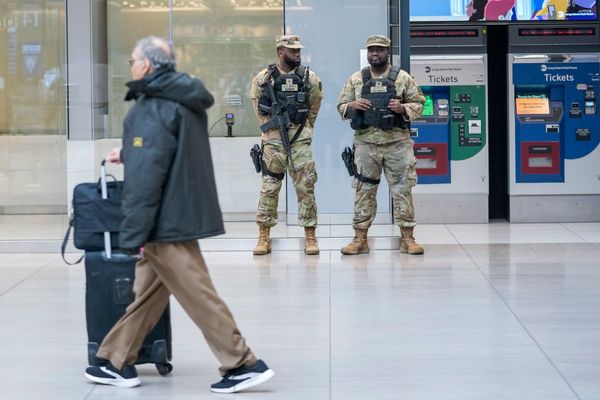
In New York City last month, Mayor Eric Adams announced new plans to combat a sharp rise in gun violence. Some progressives worry that the proposal—which includes measures to crack down on illegal gun use—is a Trojan horse to reverse recent criminal-justice reforms. But Manhattan’s progressive district attorney, Alvin Bragg, seems to be on board with Adams’s efforts. While campaigning last year, Bragg said that he would “avoid prosecuting people for gun possession unless they were actually involved in violent crime,” The New York Times reported. Now, “in a sign of the shifting concerns,” he says he’ll aggressively prosecute gun possession and other crimes, “a seeming response to pushback for his adoption of lenient policies.”
Gun cases pull progressives in opposite directions. They generally favor the strict gun-control laws that prevail in many liberal jurisdictions, commonly advocating even stricter laws meant to reduce gun possession and crime. Yet they are also sharply critical of laws that yield long prison sentences disproportionately for men of color and cut against reformers’ push to reduce mass incarceration. And anti-racist ideology offers no simple answers about how aggressively to prosecute gun cases. Which should a D.A. opposed to racial inequity prioritize—the disproportionate rate at which Black and Latino residents are arrested for possessing firearms, or the disproportionate burden gun violence and deaths impose on those same communities?
In some cities, avowedly progressive prosecutors continue to seek stiff penalties in gun cases. In Baltimore, State’s Attorney Marilyn Mosby has continued to pursue gun charges, even as she has curtailed the prosecution of a wide range of nonviolent offenses, including drug possession, prostitution, and attempted distribution of illegal drugs. Chicago’s top prosecutor, Kim Foxx, “campaigned on shifting prosecutors’ focus to gun violence amid a spate of killings,” the Marshall Project reported in a 2019 analysis of her tenure up to that point. “Two and a half years later, approval rates and felony prosecutions are trending down for nearly every offense category. Gun charges are an exception. They are the only major category to increase under Foxx.” In 2020, Foxx responded to critics by touting her gun prosecutions.
[Zaid Jilani: Progressive denial won’t stop violent crime]
Los Angeles County District Attorney George Gascón has chosen a different approach. Upon taking office in December 2020, he declared his intention to stop using a legal provision that allows prosecutors to seek longer sentences for convicted criminals who used guns in their crime. A subsequent analysis by the local-news site LAist found a 63 percent drop in gun charges filed by his office.
Public fights about such changes typically erupt after high-profile gun crimes. One recent controversy was the murder of Fernando Arroyos, who went to Los Angeles public schools, attended UC Berkeley, and returned home to become an officer in the Los Angeles Police Department. Last month, the 27-year-old was shot to death while house-hunting with his girlfriend in an unincorporated neighborhood in South L.A. where the Florencia 13 gang operates.
The L.A. County Sheriff’s Department, which conducted the investigation, alleged that four people associated with the street gang were trying to rob Arroyos of a silver chain. But rather than giving the murder case to Gascón, the sheriff’s department called federal prosecutors. “We definitely had a conversation with the local DAs and their response was not satisfactory,” Sheriff Alex Villanueva said. He concluded that Gascón’s team would charge the suspects with simple murder, without seeking the longer sentences that state law provides for gang- and gun-related offenses. “And that,” Villanueva argued, “did not really cover the depravity of this crime.”
Perhaps the foremost proponent of rethinking the prosecution of gun crimes is Larry Krasner, a former defense attorney who, upon taking office as Philadelphia’s district attorney in 2018, was determined to ease off prosecuting numerous offenses, including gun possession. Krasner has argued that many of his former clients carried guns “to protect themselves because they did not feel they could count on police to do the job,” not to commit crimes. “You may have a law-abiding person … who gets beaten up and who goes to purchase a firearm but does not know enough to get a permit, or maybe reads some misleading website from the NRA informing him he has rights he doesn’t actually have, and so is carrying that weapon for self-defense,” Krasner said in remarks quoted by The Philadelphia Inquirer in 2019. “If you go ahead and prosecute that person, it is very likely that you are going to seriously limit the capacity of that person to complete college. You will definitely limit their earning potential, their capacity to get a job.”
The newspaper reviewed a gun crime with a sympathetic defendant of that sort. Aleudis Velez-Arias was an employee at a corner store who shot a man while trying to stop a fight. “When the fighting erupted, Velez-Arias, then 25, got a handgun, which he later told police he owned but does not have a permit to carry,” The Inquirer reported. “Trying to scare the fighting men out of the store, he fired twice toward the floor, hitting a man in his left leg, according to court records.” Rather than being prosecuted on gun charges, he was allowed into a diversionary program because “Velez-Arias had a strong claim of self-defense or defending others.”
[Jeff Asher and Rob Arthur: The data are pointing to one major driver of America’s murder spike]
In Philadelphia, Krasner’s critics—including other prosecutors and the local police union—counter by pointing to cases such as that of Maalik Jackson-Wallace, first arrested in 2018 for possessing a gram of marijuana and a concealed, unlicensed gun. Krasner’s office recommended a diversionary program. “His record could have been expunged if he had successfully completed the program,” The Inquirer reported. But he was “arrested again on gun-possession charges in March … He was released from jail after a judge granted a defense motion for unsecured bail. And on June 13, he was arrested a third time—charged with murder in a shooting two days earlier in Frankford that killed a 26-year-old man.”
More generally, advocates of harsher prosecutions believe that a more aggressive approach to gun crimes would deter Philadelphians from carrying guns, thereby reducing shootings, and that Krasner’s approach is irresponsible, particularly at a time of record-setting gun violence in Philly.
Arguments such as Krasner’s aren’t held exclusively by a faction of progressive reformers. Indeed, they find more support among pro–Second Amendment libertarians than among traditional civil-rights groups. The February 2022 issue of Reason, a libertarian magazine, features a cover story by Jacob Sullum, “Gun Control Is Just as Racist as Drug Control.” In the same issue, Reason’s editor in chief, Katherine Mangu-Ward, argues that gun-control laws are wrong because they violate the right to self-defense, because they were historically “crafted with discriminatory intent,” and because they create racially disparate outcomes. “It seems to be much easier for politicians, pundits, and activists on the American left to see how the war on drugs hurts everyone, but especially black people, and to move from there toward strategies for ending or reducing that harm,” she writes. “Yet too many remain stubbornly unconvinced on guns.”
In contrast, civil-rights organizations that champion stricter gun-control laws argue that they advance racial equity because Black men are more likely to be victims of gun violence. For example, the NAACP Legal Defense and Educational Fund argued in a recent amicus brief that “handgun violence deprives many residents of an equal opportunity to live, much less to succeed. The effects of gun violence on Black Americans are particularly acute, as Black people, and specifically Black men, are disproportionately likely to experience a gun injury or death … Jurisdictions that limit handgun possession report fewer gun-related homicides and violent crimes.”
Americans have a constitutional right to bear arms and an inherent right to defend their own life and liberty. At the same time, increasing numbers of guns seem to result in more violent crime, including murders, which rob victims of their right to life. I myself would rather live in a neighborhood where guns are rare than one where they are common.
[David Frum: How to persuade Americans to give up their guns]
But not every means of getting a gun off the street is legitimate. Some anti-gun policies, such as stop-and-frisk, burden law-abiding people; others, such as sentence enhancements for gun use in violent crimes, mostly burden people who used a weapon to violate the rights of others. I broadly share criminal-justice reformers’ aversion to mass incarceration and excessively lengthy or punitive prison sentences––to deter crime, likelihood of punishment is more important than length. But another focus for reform properly involves shifting away from harshly punishing minor and victimless offenses and toward reserving the harshest penalties for threatening a life.
That standard is consistent with additional penalties for people convicted of using a gun to rob someone, let alone to kill them. A tougher call concerns defendants caught with a gun during a nonviolent crime or after having been previously convicted of a felony. Are they just trying to protect themselves in a neighborhood where the local police are consistently failing to stop violent crime, or are they arming themselves unlawfully to victimize other people? As a prosecutor, I’d try to answer that question, generally erring on the side of second chances. But where solid evidence suggests that a gun was used to intimidate or victimize other people, even reform-minded prosecutors can seek stiffer sentences in good conscience. Conventional wisdom among robbers and other criminals should be “It isn’t worth it to use a gun.” And I suspect that prosecutors unwilling to send that signal won’t survive in office for long.







